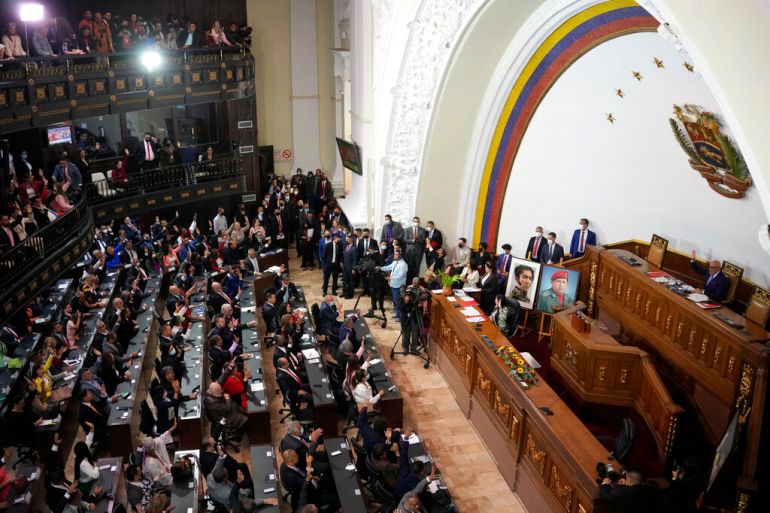Venezuelan court issues warrants for new opposition leaders
The government of Nicolas Maduro has been criticised for barring potential challengers from seeking office.

A court in Venezuela has issued arrest warrants for three opposition leaders who have publicly denounced the socialist government of President Nicolas Maduro, accusing them of treason, money laundering and impersonating public officials.
The warrants come after the three legislators were named last week to the head of Venezuela’s opposition government, which refuses to recognise the authority of Maduro’s presidency. Dinorah Figuera was appointed president of Venezuela’s opposition legislature alongside two vice presidents, Auristela Vasquez and Marianela Fernandez.
Keep reading
list of 3 itemsColombia and Venezuela to fully reopen shared border
Spain appoints new ambassador to Venezuela as relations thaw
All three live abroad to avoid what they describe as harassment from Maduro and his supporters.
Speaking on television on Monday, Venezuela’s Attorney General Tarek Saab said that Maduro’s government has asked the International Criminal Police Organization (Interpol) for assistance in apprehending the three legislators.
“These three citizens live abroad — two in Spain and one in the United States. We are going to see what the governments of those countries do with our requests,” Saab said.
The split in Venezuela’s government began in 2019, following Maduro’s inauguration to a second term in office. The 2018 election had been bitterly disputed after several opponents were banned from challenging Maduro at the ballot box.
With Maduro set to embark on another six-year term, the opposition-controlled National Assembly stated that it would no longer recognise him as president. Instead, it appointed Juan Guaido, a little-known politician, as Venezuela’s “interim president”.
The move sparked an international crisis, as countries like the US and the United Kingdom chose to acknowledge Guaido’s government over Maduro’s. But Maduro immediately denounced Guaido’s leadership as illegitimate.
In the years since 2019, the opposition has continued to operate a legislature that acts as a shadow of the country’s current National Assembly, which is supported by Maduro.
However, efforts to remove Maduro appear to have lost steam. Recently, governments such as Spain, Colombia and Brazil have moved to re-establish ties with his government.
The opposition and Maduro’s government resumed talks in November, hoping to find a solution to the political crisis that has plagued the country for years.
Guaido was removed as leader of the opposition in a vote at the end of December, as legislators prepare for Venezuela’s 2024 presidential election. Figuera was selected as his replacement, with Fernandez and Vasquez joining her to form a triumvirate.
But the appointment of the all-woman leadership team prompted criticism from Maduro and his allies. Socialist party leader Diosdado Cabello criticised the opposition government as a fiction, saying: “They love to live in a fantasy. They love to live dreaming.”
On Monday, Saab, the attorney general in Maduro’s government, accused the opposition leaders of violating Venezuela’s constitution and improperly seizing state assets with the support of foreign governments.
During a Zoom forum, Figuera said that “intimidation will not make us give up”.
“While they keep pursuing and criminalizing,” she said, “we will keep going with our agenda.”